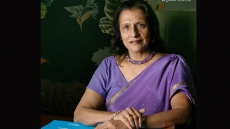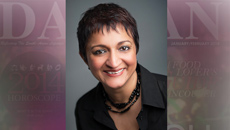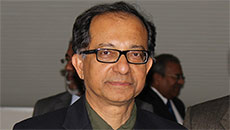Saumitra Saxena is a well-accomplished poet who has contributed immensely to the field of Hindi literature, with works that have been acclaimed not only in India, but overseas as well. For the past 17-18 years, Saxena has been writing poems and is recognized as a noted personality in the world of contemporary Hindi poetry. Over 150 poems and numerous short stories are credited to his name and several of them have been published in Indian newspapers and journals.
Hailing from India, Saxena was born and raised in Meerut, a historical city in the state of Uttar Pradesh. "Living and growing in this part of India was a fascinating experience and I always effortlessly locate pedigrees of my poetic psyche here," says Saxena describing his childhood years. But what intrigued this poet's interest in writing these great pieces? "I have the great fortune of personally knowing, Gopal Das Neeraj, one of the most celebrated romantic poets of India. Neeraj, a Hindi poet and lyricist of the several immortal songs of Bollywood actors Raj Kapoor and Dev Anand, is a grandpa to me in a distant relation." He continues describing days where his father used to accompany him to Kavi Sammelans (poetry recitation events) where Neeraj would also participate. "His voice and words became a part of my earliest childhood imprints."
Amid his numerous pieces of work, Saxena's first poetry collection, Mitra, meaning friend, was critically acclaimed and he received the prestigious Bhartiya Jnanpith Navlekhan Award in 2008. The award is conferred to emerging writers in Hindi language under the age of 35 years, by the Bhartiya Jnanpith, India's foremost literary foundation and publishing house. After completing his graduation from India, Saxena flew to Chicago to pursue a PhD in chemical engineering. Saxena continued writing poems and sent them to India where his poetry pieces were regularly published in print. His highly-praised work Mitra, achieved tremendous appreciation in the US and is also included amongst other noted literature pieces in US universities and Washington DC based Library of Congress.
Q&A WITH MR. SAXENA
Q: What would you describe as your biggest achievement so far?
A: It would be simply wrong to even think that I have achieved much of anything yet. Some appreciation is surely there. But more quality work needs to come out from my desk to secure any durable presence. I just want to keep writing for 30-40 years if my destiny permits that. Sometimes, it makes me happy to think that my childhood memories and family stories are now part of the Library of Congress. They will be preserved for a very long time. Can I really call it an achievement? I don’t know. I just leave it there with some content.
Q: What are your other interests apart from poetry?
A: I am learning spirituality. Trying to be spiritual without being religious. Deepak Chopra’s writings are a main source of my knowledge on this subject. It all started one day in a library in Dayton, when I accidently laid my eyes on one of his book, ‘How to know God.’ I was a non-believer. Chopra quoted Jiddu Krishnamurti at one place, “I used to be an atheist until I realized I was God.” The words stuck with me and I started looking into some aspects of spirituality, science and religion. My upcoming poetry collection, titled Neele Pakshi, Safed Akash, delves deep into the interconnect of some of these issues.
Q: What are your plans for the future?
A: I am working on a novel which is based on the life and times of revolutionary Jatin Das and his younger brother Kiron Das. Titled Amar Chitra, it’s a part real part fantasy love story themed around the Das family. A good amount of research has already gone in on this subject. I will be putting the pedal to the metal soon. On a parallel track, I am working on a long poem titled, Din-E-Ilahi (‘Religion of God’).
Q: If you had to give advice to youth about the field of poetry, what would you say?
A: Originality at every level is very important. Especially that of thought, language and style. Young folks should focus on developing their own mar¬quee. I never recommend too much reading. One can carry impressions of studied material into one’s own writ¬ing, compromising the freshness. This is certainly not to say that we should not read others, but more a note of caution against a grave danger. Travelling extensively, relating with diverse set of people, exploring life in innovative ways can help generate good ideas.





